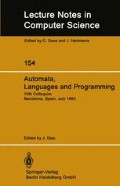Abstract
The method of algebraic specification, when extended to inductive continuous algebras, is a convenient tool for defining and describing domains with nonstrict operations and with limit points. This replies to a number of remarks in [8] on the “restrictiveness” of algebraic specifications. Moreover, our approach has the advantage that the characteristic properties define the semantic domains, whereas in [8] they have to be proved.
Our main aim was to show how correct operational semantics can be derived from a mathematical semantics in terms of operative continuous algebras. Such algebras are defined by equations of a certain restricted form which provide a reduction calculus for the evaluation of terms over the algebras. By organizing the application of the rules suitably various operational realizations (here lazy and busy evaluation) of the mathematical semantics can be obtained.
Further research should concern techniques for implementing continuous algebras specified by more general kinds of axioms (e.g. conditional equations, see [16]) in terms of operative ones. In this way a first specification could be free of operational details which should only be introduced in a later stage of the development process.
This work was partially sponsored by the Sonderforschungsbereich 49, Programmiertechnik, Munich, Fed. Rep. Germany
Preview
Unable to display preview. Download preview PDF.
References
J.A.Goguen, J.W.Thatcher, E.G.Wagner, J.B.Wright: Initial algebra semantics and continuous algebras. JACM 24, 68–95 (1977)
J.B.Wright, E.G.Wagner, J.W.Thatcher: A uniform approach to inductive posets and inductive closure. MFCS 1977. LNCS 53. Berlin: Springer 1977, 192–212
J.Backus: Can programming be liberated from the von Neumann style? A functional style and its algebra of programs. CACH 21, 613–641 (1978)
F.L.Bauer: Detailization and lazy evaluation, infinite objects and pointer representation. In: F.L.Bauer, M.Broy (eds.): Program construction. LNCS 69. Berlin: Springer 1979. 406–420
F.L.Bauer, H.Wössner: Algorithmic language and program development. Berlin: Springer 1982
S.L.Bloom: Varieties of ordered algebras. JCSS 13, 200–212 (1976)
M.Broy: Transformation parallel ablaufender Programme. Fakultät für Mathematik der TU München, Dissertation, 1980. Institut für Informatik der TU München, TUM-I8001, 1980
R.Cartwright, J.Donahue: The semantics of lazy (and industrious) evaluation. Conf. Record of the 1982 ACM Symposium on LISP and Functional Programming, 253–261
B.Courcelle, M.Nivat: Algebraic families of interpretations. 17th FOCS 1976, 137–146
D.P.Friedman, D.S.Wise: CONS should not evaluate its arguments. In: S.Michaelson, R.Milner (eds.): Automata, languages and programming. Edinburgh: Edinburgh University Press 1976, 257–285
J.V.Guttag: The specification and application to programming of abstract data types. Ph.D. Thesis, University of Toronto, Dept. of Computer Science, Rep. CSRG-59, 1975
P.Henderson, J.H.Morris: A lazy evaluator. 3rd POPL 1976, 95–103
G.Huet, J.-M.Hullot: Proofs by induction in equational theories with constructors. 21st FOCS 1980, 96–107
S.C.Kleene: Introduction to metamathematics. New York: Van Nostrand 1952
Z.Manna: Mathematical theory of computation. New York: McGraw-Hill 1974
B.Möller: Unendliche Objekte und Geflechte. Fakultät für Mathematik und Informatik der TU München, Dissertation, 1982. Institut für Informatik der TU München, TUH-I8213, 1982
M.Nivat: On the interpretation of recursive polyadic program schemes. Istituto Nazionale di Alta Matematica, Symposia Mathematica XV. London: Academic Press 1975, 255–281
P.C.Treleaven, D.R.Brownbridge, R.P.Hopkins: Data-driven and demand-driven computer architecture. Computing Surveys 14, 93–143 (1982)
J.Vuillemin: Correct and optimal implementations of recursion in a simple programming language. JCSS 9, 332–354 (1974)
J.Vuillemin: Syntaxe, semantique et axiomatique d'une langage de programmation simple. Basel: Birkhäuser 1975
Author information
Authors and Affiliations
Editor information
Rights and permissions
Copyright information
© 1983 Springer-Verlag Berlin Heidelberg
About this paper
Cite this paper
Möller, B. (1983). An algebraic semantics for busy (data-driven) and lazy (demand-driven) evaluation and its application to a functional language. In: Diaz, J. (eds) Automata, Languages and Programming. ICALP 1983. Lecture Notes in Computer Science, vol 154. Springer, Berlin, Heidelberg. https://doi.org/10.1007/BFb0036933
Download citation
DOI: https://doi.org/10.1007/BFb0036933
Published:
Publisher Name: Springer, Berlin, Heidelberg
Print ISBN: 978-3-540-12317-0
Online ISBN: 978-3-540-40038-7
eBook Packages: Springer Book Archive

